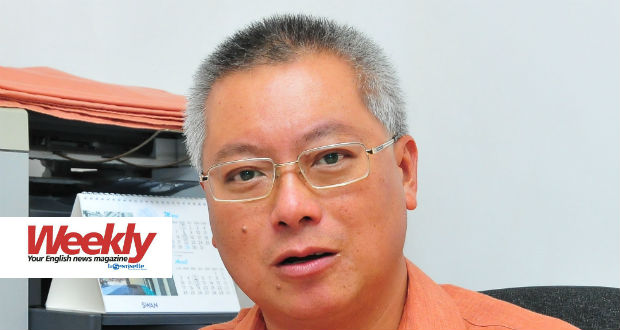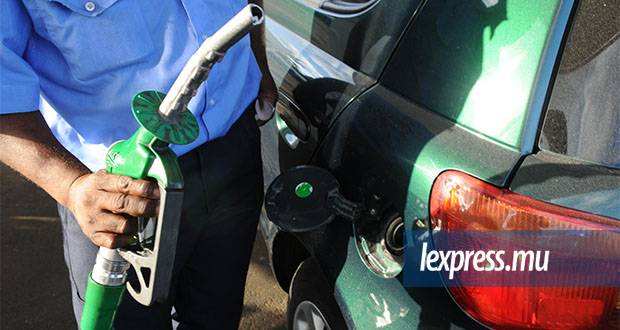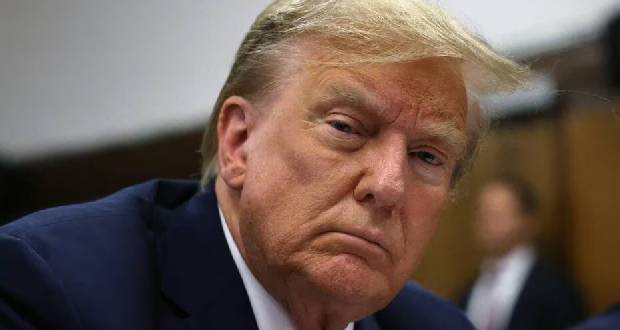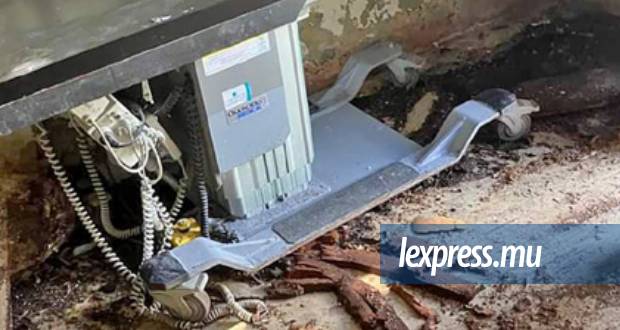Publicité
Eric Ng Ping Cheun: “I think our real public debt has gone above 70 percent.”
Par
Partager cet article
Eric Ng Ping Cheun: “I think our real public debt has gone above 70 percent.”


This week, we speak to Economist Eric Ng about the real state of the economy, beyond the hype and the headlines. He tells us what worries him about the current direction that the economy is taking, the tricks used to mask the reality from the people and where the economy is heading.
Let’s start with the state of the economy: growth in 2018 is expected to be 3.9. That’s good enough, isn’t it?
Let me first specify here that we measure economic growth in the Mauritian context as GDP at basic prices, not at market prices.
What is the difference?
When you factor in taxes and subsidies at net of basic prices, then you get GDP at market prices. But then taxes, you can have as many as you want. In 2017, we were expecting 3.8 percent growth. That was revised downwards to 3.5 percent. So we are not near the 4 percent. Now for 2018, they expect 3.9 percent at both basic and market prices. We are still below 4 percent. Besides, this growth will, in fact, be propelled mainly by public sector investment and consumption.
Is that not good enough?
No, because as far as private investment in 2018 is concerned, we have negative growth again. There is zero percent growth in private investment. There is no growth.
How can there be no growth while people are investing?
They are just investing to renew their machinery and equipment, but not in any new projects.
What about all these smart cities that we have been hearing about?
Perhaps there is investment there, but that’s also accompanied by disinvestment in other sectors. So overall, there’s zero percent real growth. In Export-oriented enterprises, for example, we expect 0.7 percent growth. So in fact, the two motors of growth, private investment and exports, are stagnating. We will not cross the psychological barrier of 4 percent.
But when the MCCI came out with its perception surveys, it showed that there is optimism. Does optimism usually not translate into investment?
The MCCI speaks for its members. Member-enterprises of the MCCI do not represent the Mauritian economy which consists of tens of thousands of companies. Regardless of what the MCCI surveys tell, I believe there is a trust deficit in the economy.
Why is that, according to you?
Because of the political governance and leadership. We saw this at play recently with the crisis at the head of the State. The events which have been unfolding do not instill trust. I mean who would invest in a country where the president and the prime minister are at loggerheads?
But that was just a short chapter, wasn’t it?
Each month there is a problem in terms of political governance. As far as economic leadership is concerned, we do not have a full-time minister of finance. What we have is a minister who only reads the Budget and who comes up with expeditious measures. He only reacts to a crisis; he doesn’t foresee. There is no vision. For example, he comes up with the exchange rate support scheme which the International Monetary Fund (IMF) disapproves of since it is a discriminatory measure in favour of exporters. This is firefighting. I don’t see a long term vision and a minister of finance who is present. Moreover, there are no real structural reforms within the economy to obtain productivity gains in the public sector, on the labour market.
Isn’t unemployment going down though?
Well, unemployment is going down only because the government is creating jobs in the public sector, but is this sustainable in the middle and long-run? I don’t think so.
What are the risks?
The risk is an increase in the public debt. By creating jobs in the public sector, salaries will go up, minimum wage will apply in the civil service too and, since we have an ageing population, the cost of the state pension will rise. I believe we have big issues in terms of public finance ahead.
Pravind Jugnauth has just said that in spite of all those investments in the country, our public debt has not gone up. By what magic did he achieve that?
By avoiding to tell you that some debts have not been included in the figures he tabled. There are a lot of contingent liabilities with the Metro Express which he is financing outside of the budget. Also, there is a moratorium on the debt to India. We haven’t started paying back yet. When we do, the government will pay back through vehicles funded by, I gather, the State Bank of Mauritius (SBM). But the government has given a guarantee: in case those vehicles are unable to pay through the SBM, the state will then pay.
You are talking about these special vehicles and contingent liabilities. Whatever debt we have doesn’t actually show up in our public debt and Moody’s doesn’t get to know. Isn’t that magic?
It is not magic! It is a colourable device in public finance. I believe Moody’s does not take into consideration these contingent liabilities regarding the financing of the Metro Express and other projects. But the day of reckoning will eventually come. They are spending now, knowing they won’t be here when we have to foot the bill. It’s their political survival which comes first.
Are these special vehicles something new?
I think it’s something new. As Rama Sithanen said, if it were that easy to make a debt disappear, all public projects could have been funded this way, then we wouldn’t have any debt. One way or another, the state vouches to repay these loans.
Why did the government do this, then?
So that they can say, “We’re reducing our debt!” Just as Pravind Jugnauth said, “We are investing but we are not increasing public debt!” In fact, the government has failed in its objective to reduce the public sector debt (government + public enterprises) to 50 percent of the GDP by 2018. It was in the law. Last year, the law was amended to target 60 percent by 2022. These are commitments the government takes vis-à-vis international institutions like the IMF so as to show that the debt isn’t going up.
If there weren’t these special vehicles, that you call a colourable device, what would our real debt be?
I think our real public debt has gone above 70 percent.
Are we in the danger zone?
Yes, considering that we don’t have resources. Other countries like Japan can go above 70, 80 percent since they have resources, technology, petrol, gold, etc. What do we have? We only have our own human skills. It’s a dangerous situation.
If I understand properly, you’re saying that our debt is very bad at 70 percent, but that our government has found ways of hiding that.
They have found ways of excluding a certain debt.
There are no other advantages other than hiding the debt?
The advantage is that we’re showing the international community that we’re managing our public finances well when, in fact, we’re not.
Don’t international organisations know this? Are there no other countries as crooked as we are?
(Bursts out in laughter) International organisations, I believe, are quite lenient vis-à-vis Mauritius considering its performance relative to other African countries.
Isn’t that a myth now that we’re doing better than other African countries? If you look at the growth in other African countries, we’re lagging behind, aren’t we?
In terms of economic growth, others are at 5,6 percent of economic growth, though they are starting from a low base. Some other countries, like Rwanda and Ghana, are becoming as competitive as Mauritius, if not more competitive. Politically, we have started trailing behind some African countries. We are not an appeased democracy anymore; we’re an agitated democracy with all the scandals impacting the government and, recently, the presidency. And there is a lot of opacity. We cannot set up a commission of inquiry into the Alvaro Sobrinho case, for example. In parliament, question are not answered, details and information are left out and we hide behind institutions... The way we are running the country, we’re not far off African countries.
You talked about the commission of inquiry into the Sobrinho saga, the PM invited people who have something to say about that to go to the ICAC. Isn’t that good enough for you?
It’s not. The ICAC inspires less and less trust in the public. Someone deponing before the ICAC doesn’t know if confidentiality will prevail. I also gather that ICAC deals with public officers. Can the ICAC investigate a transaction involving two private parties, two people who are not public officers? We need an enlarged commission investigating everyone involved in the Sobrinho case.
Aren’t you satisfied with the other commission of inquiry into what happened before the president resigned?
I believe the former president violated the constitution. Maybe it was a means for her to strike back against the prospect of an impeachment tribunal. I find it inconceivable that a president of the republic who violated the constitution is earning a state pension. But we need to go beyond this commission and look at the constitution. The commission will come up with findings. Based on these findings, a debate will be needed to see how the constitution should be amended to review some of the privileges of the president. But we also need to know if this commission is a mere political vendetta.
Have the alliances between parties already been formed as it is rumoured in the opposition?
Politics is a question of perception. I don’t think that driving the president out is a deliberate action by the government to form new alliances. I think the president erred on her own. I have the impression, though, that the MSM, with the ML, have few chances of winning the next general elections. So, I gather that the MSM is looking for an alliance with the MMM. The mentor minister said it himself in a radio interview.
What does the MMM stand to gain from an alliance with a party that has messed up big time?
I think that the MMM would lose less by going on its own than by contracting an alliance with the MSM. Politicians still believe that an alliance gives another dimension. The 2014 elections showed that an alliance does not always amount to 2 + 2 = 5, it could also mean 2 + 2 = 3.
What about the Labour Party, the PMSD and the MP?
I believe the Labour Party can go on its own. It’s been boosted by the No. 18 by-election in December. All will depend on the 10 rural constituencies which usually vote en bloc. For the PMSD, it is clear that it will not be able to go on its own, in light of its performance in the by-election. It’s therefore more likely that the PMSD will seek an alliance with the Labour Party than the other way round. As for the MP, it’s such a small party that, if they contract an alliance with the Labour Party, they will melt into it and MP candidates would run as Labour candidates.
What will be the outcome?
( Laughs) It’s a bit too early. One week is a long time in politics. The government is unpopular; there is no doubt about that. How will that show in the elections? We’ll see; things can change just as they can worsen.
For more views and in-depth analysis of current issues, Weekly magazine (Price: Rs 25) or subscribe to Weekly for Rs110 a month. (Free delivery to your doorstep). Email us on: weekly@lexpress.mu(link sends e-mail)
Publicité
Les plus récents






